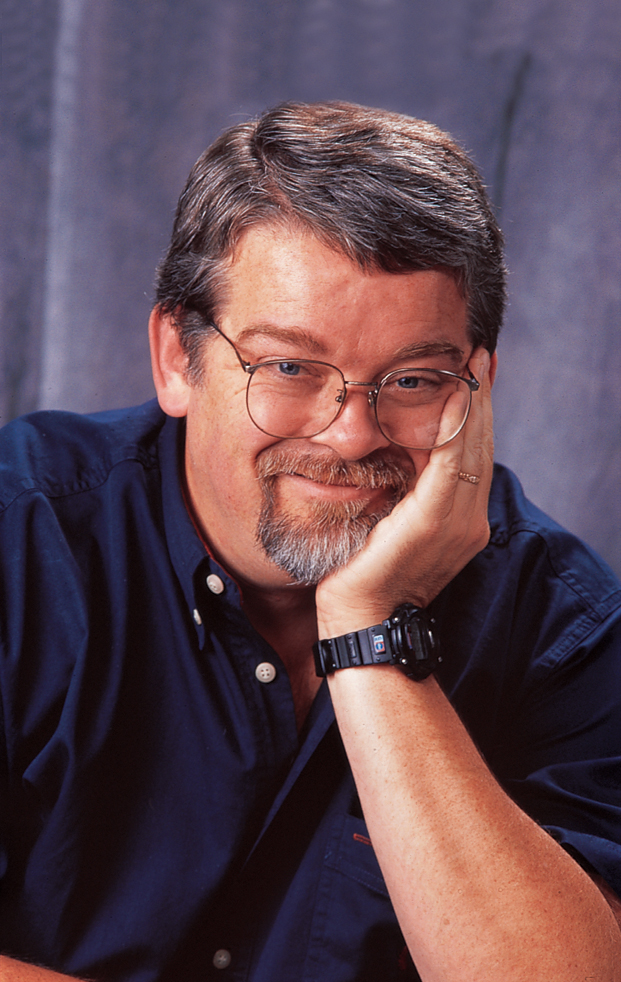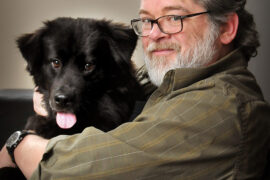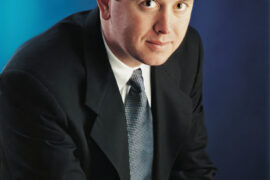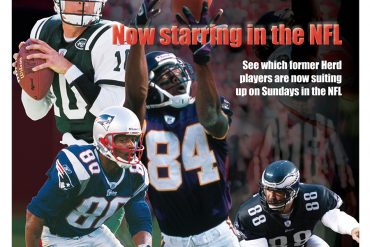By Clint McElroy
HQ 84 | WINTER 2014
Third Floor. Smith Hall. Marshall University. 1976.
“Excuse me, Mr. McElroy? Mr. McElroy?”
“Oh, yeah, sorry. Sir?”
“If you can tear yourself away from exchanging pleasantries with Miss Cox for a few precious moments, I’d like to talk to you about your writing assignment. That is, if you aren’t too busy?”
That was my introduction to C. Bosworth Johnson, aka Bos Johnson or “The Bos” as I like to call him.
Broadcast Journalism was the class, and he was the professor. Of course, growing up around these parts I knew who he was. I had watched him deliver the news every night on WSAZ. He was an anchorman from the Old School. You trusted him. You understood him. Somehow he could explain the nuances of a story in ways you could grasp. And most importantly, he could get across the emotion and the importance of a story without ever taking sides. In today’s modern era when the most trusted newsman on television is a comic behind a news desk on Comedy Central, that is a huge distinction.
But at that moment in 1976, I didn’t see him as a venerated broadcasting icon, I saw him as some dude in glasses standing between me and Connie Cox’s phone number.
You see, 1976 was pretty much the pinnacle of the Clint McElroy College Experience. I was the news director at Marshall’s WMUL-FM, working part-time at WKEE, anchoring MU Report on WPBY-TV and writing a weekly humor column for the Marshall student newspaper, The Parthenon.
It was the closest I was ever going to get to being a Big Man On Campus. So it was the most opportune time to make a play for Connie Cox. The dude in glasses had other ideas.
Bos: I was going over the news copy you wrote for yesterday’s WMUL newscast.
Me: Yeah, I was really on my game yesterday. Bos: I was especially intrigued by the lead story.
Me: Yeah, yeah – the restaurant fire. I thought I captured the excitement of fighting the inferno and the heartbreaking loss of the restaurant owners, and at the same time made it obvious that I was familiar with the finer dining establishments of Huntington. (As I gave a knowing look to Connie Cox.)
Bos: Ahhhh, I see. Allow me to share some of your exciting, heartbreaking news copy: “The building was completely destroyed.”
Me: Well, I had some longer sentences in there…
Bos: True, but none so poorly written as this one.
Me: Well, thank you…wait, what?
Bos: Where was the attribution? Who said the building was destroyed?
Me: One of the firefighters.
Bos: Then that should have been part of the sentence. You are the reporter. Your job is to pass along the facts, NOT your judgments. YOU don’t have the expertise to determine if a building is “destroyed.”
Me: “COMPLETELY destroyed.”
Bos: And that brings us to your FINEST journalistic moment. What does the word “destroyed” mean?
Me: Uhhh, demolished?
Bos: COMPLETELY. Destroyed means razed to the ground, no longer exists. “Destroyed” IS complete. There is no such thing as “completely destroyed.” It is like saying “fatally murdered” or “moist water.”
Me: Ohhh, okay.
Bos: No, not okay. Journalism is not just a job. It’s a responsibility. You are entrusted by the public to present the truth as clearly and completely as you possibly can. Your words must be precise. When people read your writing, or hear your words, YOU are not part of the equation. YOU are not part of the story. You have to take yourself out of it and be a conduit for the information. Just the information. You don’t interpret. You’re not a commentator, you’re not an analyst. You’re a newsman.
Bos Johnson became my mentor. Between him and his brilliant wife Dotty, I learned everything I needed to learn about broadcasting, not just news. Whenever I had big questions, he was always there with big answers. Like the time I called him from sunny Tampa, Fla., to ask if I should give up my job there to take the news director’s gig at WKEE in not-so-sunny Huntington, W.Va.
Like all the advice he gave me, that one turned out amazingly well. And while I didn’t get a date with the lovely Connie Cox, I did get a surrogate dad.
Newsroom. WKEE Studios. Huntington. 1980. I had just finished the 12:50 p.m. newscast. In the lead story, I had reported that a home had been “almost completely destroyed” by a fire. Not just destroyed. Not just completely destroyed. Almost completely destroyed! I looked over and saw the blinking light that indicated I had a call on the newsline. And I knew EXACTLY who it was.





